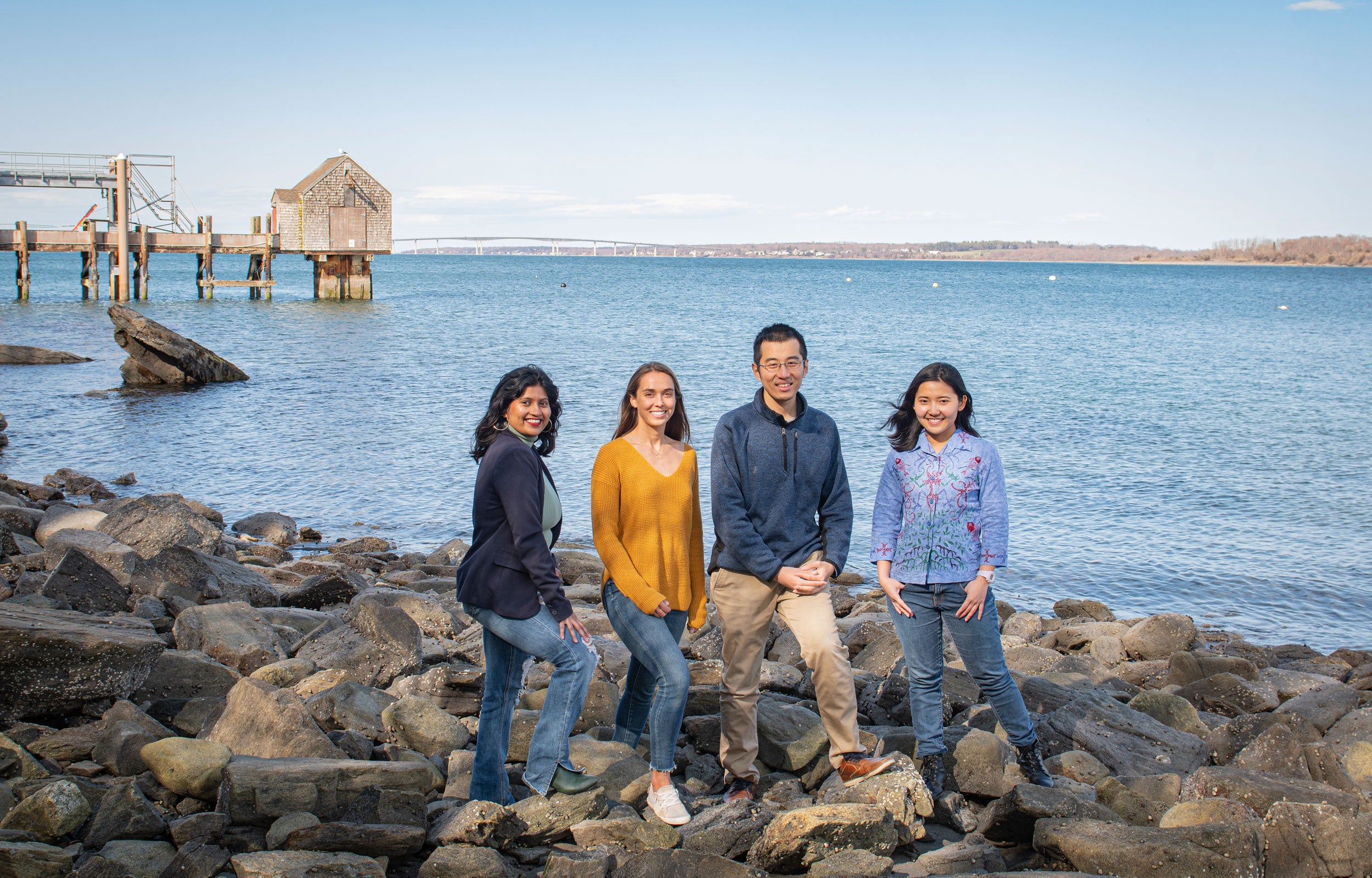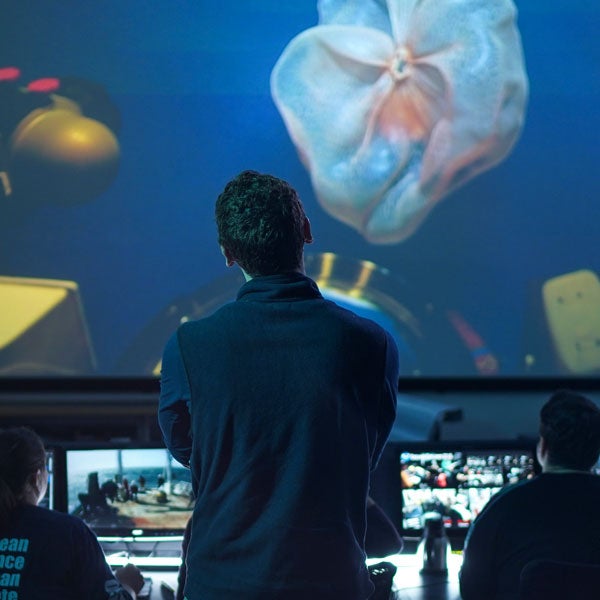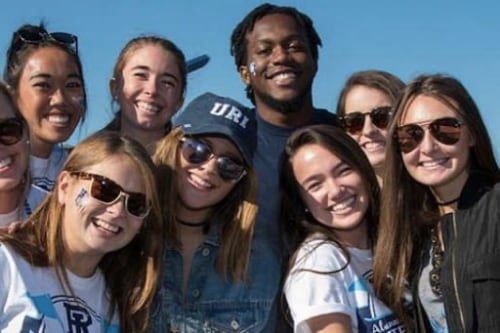
Illegal, unreported, and unregulated fishing costs the global economy $10 to $23.5 billion annually and is the number one maritime security threat facing the United States. The U.S. Coast Guard says illicit fishing creates tensions between nations that could undermine geopolitical stability.
It’s a wicked problem, but a group of URI graduate students has developed a business plan that could assist the Coast Guard and other enforcement agencies in better patrolling and reporting illicit fishing worldwide.
Graduate students Christine de Silva ’23, Erfa Fachroni ’22, Monica Rao ’22, and Xiaozhuo Wei ’23 were among the students in the inaugural Hacking4Oceans course, which took place last fall. In it, they developed I-Sea-U, a business plan for a product and process that allows enforcement agencies to report illegal fishing via an app, which would collect evidence-based data, accelerate the report filing process, and alert enforcement agencies of criminal activity in real time.
Hacking4Oceans asks students to develop a solution to a critical and complex problem facing our oceans. The interdisciplinary course requires student scientists to think like entrepreneurs and activists, notes Wei, an international student from China studying geological oceanography.
“As a Ph.D. student in GSO, I focus on pure science,” says Wei. “My motivation in coming to this class was to know if there’s any chance my knowledge and background could help people. I see it as a win-win: I can make money and people would get the benefit of my products.”
Student-led, experiential learning
Faculty from the Graduate School of Oceanography and the College of Business as well as URI Launch Lab, a campus center for innovation and entrepreneurship education, guided the students in developing their solution, a product or service, and a business plan to bring it to market. The course, though, is largely student-led, experiential learning, said Jaime Palter, associate professor of oceanography. Palter is one of the GSO faculty members who worked to bring Hacking4Oceans to URI. A national initiative developed by environmentally conscious business leaders, Hacking4Oceans engages university students in applying mission-driven entrepreneurship to global marine and coastal problems.
Hacking4Oceans students gain experience in entrepreneurship, networking, marketing, activism, policy-making, and finance while working with an established industry partner. The I-Sea-U group chose illegal fishing in marine-protected and closed fisheries areas in collaboration with their partner ThayerMahan, a Groton, Conn.-based global manufacturer of maritime surveillance solutions for defense systems. “ThayerMahan came up with the idea to monitor a marine-protected area using their products,” said Fachroni, an international student from Indonesia who is pursuing a master’s degree in marine affairs with a focus on conservation. “It set the stage for us to work on conservation of a marine-protected area to eliminate illegal fishing.”
Blue economy businesses are the future, and they‘re what's going to bring change.”Christine de Silva
Over the course of the 13-week semester, students interviewed professionals and experts in various fields: faculty members, scientists, and business owners, among others. For de Silva, a Blue MBA student pursuing dual master’s degrees in oceanography and business, the project affirmed her belief that a scientific mind with a head for business is a good thing to have.
“I don’t think that we can make real change on environmental and ocean-related problems without having a business mindset, without understanding the money flow, without understanding how to influence,” said de Silva. “Blue economy businesses are the future, and they’re what’s going bring change.”
Deedee Chatham, director of URI Launch Lab, praised the students’ initiative and underscored the value of the course in propelling thinking about the blue economy.
“Since the class incorporates industry sponsors to identify the problems teams will work on, the students are working in the blue economy at the outset. The experiential framework gets them out of their comfort zone, and into the world they are about to graduate to,” Chatham said. “It’s an invaluable experience. All these students are already part of the blue economy workforce here in RI by this H4O experience.”
Rao said the group began by looking at technology such as drones or satellites that would allow monitoring agencies to surveil the seas. As the students progressed in their research, though, their focus shifted to enforcement. An international student from Mumbai, India, Rao is pursuing a master’s of environmental science and management. She is interested in aquaculture initiatives and the blue economy.
A global problem such as illegal, unreported, and unregulated fishing requires a multi-pronged, top-down offensive strategy that will require and rely on the efforts of both world powers and individual citizen scientists, Rao said. It also needs to be right-sized. “When we looked at all of the different elements involved—because we wanted to create a solution that would actually be helpful rather than trying to solve everything—we decided to target specific aspects of the problem.”
To hear that what you are thinking could perhaps make a difference is really important.Erfa Fachroni
A multidisciplinary approach to complex problems
The end result is the I-Sea-U business plan that, among other things, prioritizes electronic records over paper-based reporting while building a secure data base of past fishing violations.
Students and faculty involved agree that Hacking4Oceans underscores the need for interdisciplinary approaches to thorny environmental and business problems, said Seray Ergene, assistant professor of management in the College of Business. “We want students to engage with the real ocean problems that businesses and nonprofits are trying to tackle. Those problems are never bounded by one discipline but require the knowledge and expertise of many to approach from a holistic view. In this class our goal is to bring in students from all across the campus without prioritizing one discipline.
“Students are constantly interacting with diverse stakeholders and sharing their ideas and getting feedback to see if they make sense for those stakeholders. In other words, they are listening to the people who are close to these issues or experts in the field,” Ergene said. “This brings many benefits to both students and community. While students are learning to think together, they are trying to create a solution that can address those stakeholder concerns. I do believe that we need to teach more of this type of problem-solving/decision-making in classes.”
In April, the I-Sea-U group visited ThayerMahan to present their plan.
“To hear that what you are thinking could perhaps make a difference is really important,” Fachroni said.
“That ThayerMahan is interested in our ideas and our research, that they can use it for themselves, that our work has become something a little bigger, something that will become genuinely applicable, that’s a really cool thing,” de Silva said. “I think we can all agree that’s really awesome.”
—Marybeth Reilly-McGreen


